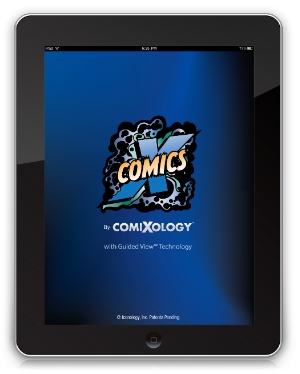April 28, 2014
New ComiXology app cuts Apple out of the profits
by Sal Robinson

ComiXology on the iPad. Still shiny, just much less convenient.
You wonder sometimes why the CEOs of newly acquired businesses bother making statements about how nothing will change, why there isn’t at least some consumer trust to be gained by admitting the truth: that a company now owned by another company will have different priorities. The latest example of this corporate bluffery was just demonstrated in Amazon’s acquisition of ComiXology, the biggest digital comics retailer.
When the news of the acquisition came out earlier this month (covered here by my colleague Nick Davies), ComiXology’s CEO, David Steinberger, and Amazon’s vice president of content acquisition and independent publishing David Naggar gave a joint interview to the website Comic Book Resources, claiming in classic fashion that it was all new and fresh and wonderful, and there were no special plans for the future, and Amazon and ComiXology were basically sitting in a tree K-I-S-S-I-N-G. And also that nothing would change. Specifically, Steinberger said things like “as a wholly owned subsidiary, we get to continue our relationships the way they are.”
And when Albert Ching, CBR editor and interviewer, pressed Steinberger and Naggar on whether there would be any ramifications for Apple, given the fact that ComiXology was now owned by their fiercest rival, they were equally assured about how it wouldn’t make any difference:
Ching: Obviously comiXology has had success with its apps on Apple’s iOS devices. With Amazon being a competitor in the tablet market, do either of you foresee this deal complicating things on that front at all?
Naggar: I don’t. Amazon, yes, is a competitor in the tablet market, but also has cross-platform apps on every platform, from iOS to Android to Windows. The philosophy at Amazon when it comes to digital content, particularly books, is, we want you to be able to consume that content wherever you want to do it. So if you choose never to buy one of our devices, you will still always have access to your Kindle library, and you’ll be able to read it on just about every platform. That philosophy already exists within Kindle, and I wouldn’t expect that to change, at all.
Ching: David S., do you share that same confidence?
Steinberger: Absolutely. Wouldn’t do it otherwise.
But you know, that’s not what’s happened. Not at all. Because last week, ComiXology announced that it was retiring its old iOS app and debuting a new one, which is purely a reader. To make purchases, users will have go outside of the app to ComiXology’s website, introducing another stage in the buying process. While not good for users — in fact, a step back in terms of ease of use — it’s very good for Amazon because it means that they won’t have to pay Apple the 30 percent cut levied on all iOS in-app purchases.
And it’s a significant blow to Apple: according to Andy Khouri of Comics Alliance, the ComiXology app is the highest grossing iOS app that isn’t a game. So, this is a change, a big one, and one that has already occasioned a lot of debate online; Khouri’s post in particular is worth reading in full on the implications of all this.
On the one hand, it seems to fly directly in the face of Steinberger’s claims that ComiXology is intended to serve not only dedicated comics fans, but also the casual reader, who might now be discouraged from reading around widely and making impulse purchases by the extra steps involved. (It’s certainly inconvenient for dedicated fans as well, whom ComiXology tried to assuage with a $5 gift certificate. As with the recent ebook refunds, some readers appear to have been genuinely delighted by the gift certificate and sent out a volley of suggestions on Twitter about how people should spend their cash. While others were a little meh.)
Other voices have argued that this change is a plus: consumers won’t have to endure Apple’s frustratingly inconsistent standards about what types of material they considered ok to sell through the iBookstore, an issue that has plagued comics like Matt Fraction and Chip Zdarsky’s Sex Criminals and Brian K. Vaughan’s Saga series. And bloggers like Nate Hoffelder at the Digital Reader pointed out that content creators may now see an increase in their share of revenues.
But it most definitely gives a monolith greater monolithic power. And, as we’ve seen in trade book publishing, when Amazon cuts somebody else out of the profits, they’re not doing it so that the little guy gets more in the long run. They’re doing it so that Amazon gets more of whatever they want: more information about buying habits, more market share, and ultimately, more control, so that, down the road, they can dictate terms to creators who don’t have any other options.
In the meantime the mood of ebullience and possibility and openness emanating from ComiXology’s higher echelon has chilled faster than a Dippin’ Dot. Comic Book Resources went back yesterday to Chip Mosher, ComiXology’s vice president of communications and marketing, to ask him about the changes, and it was a very different kind of exchange than the Naggar-Steinberger love-fest:
CBR: Were these moves in the planning stages before the Amazon deal, or is it a result of the Amazon deal?
Mosher: We don’t discuss the confidential details of our business relationships.
CBR: Are there any other changes ComiXology is considering based on the new relationship with Amazon?
Mosher: We have a policy of not talking about details of our product roadmap.
CBR: Are you considering adding the ability to use Amazon credit to buy comiXology comics?
Mosher: Nothing to announce today, but we expect we’ll find ways to make both comiXology and Amazon work better together in the future.
Sal Robinson is an editor at Melville House. She's also the co-founder of the Bridge Series, a reading series focused on translation.